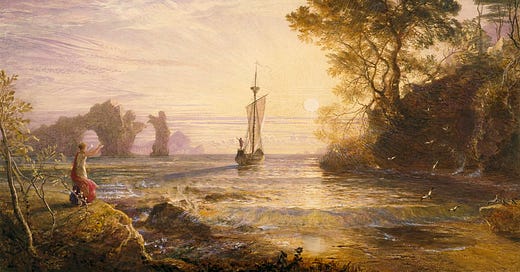Food and Hospitality in the Odyssey
I recently reread the two Homeric epics for the first time in ten years. Even though I had read them before, I was surprised all over again by how little the reputations of the poems actually reflect their content. The Iliad is “about the Trojan War,” true, but the Trojan Horse, Helen’s abduction by Paris, and Achilleus’ death by an arrow to the heel only obliquely come into the story. Similarly, we think of the Odyssey as the story of Odysseus’ adventures on his voyage home from Troy, but all of the most famous episodes – the Cyclops, the Sirens, Skylla and Charybdis, the Aiolian winds – are packed into a small section of the text (four books out of twenty-four – one sixth!).
Most of the Odyssey actually revolves around hosting and feasting. The wandering Odysseus is constantly dependent on the hospitality of strangers while he is on his journeys, and Homer describes the ways they entertain him (or fail to) in great detail. Meanwhile, back in Ithaka, his wife Penelope is acting as an unwilling host to the multitude of suitors, who banquet in her home while demanding her hand in marriage. Odysseus is an unwilling guest (one who wants to leave his hosts and go home); Penelope is an unwilling host (one who wants her guests to leave her home); and their son, Telemachos, splits his time between the roles of host and guest, watching the suitors devour his inheritance when he is not traveling in search of his father. The story revolves around relationships between hosts and guests, and this theme of hospitality is closely tied to the motif of eating, because the main form of hospitality in the Odyssey is giving the guest food to eat.
Almost every conflict in the story arises from one of three ways in which the host-guest relationship goes wrong:
(1) The host can devour the guest instead of feeding him. On the islands of the Laistrygones and the Cyclops, Odysseus and his men run afoul of hosts who literally eat their guests. Similarly, Circe tries to transform Odysseus and his men into swine – which is to say, into livestock, animals who will presumably be eaten.
(2) The guest can devour the substance of the host, taking what is not willingly given. Odysseus’ men are punished by the gods for killing and eating the sacred cattle of Helios, and Odysseus returns home to wreak a similar punishment on the suitors who have been eating up his food for twenty years.
Perhaps it is because of these appetite-driven crimes that Odysseus complains on multiple occasions about the belly, calling it “a cursed thing, which bestows many evils on men” (XVIII.287, 474). However, the host-guest relationship can also go wrong in a more subtle way:
(3) Otherwise beneficent hosts can fall into the temptation of trying to detain the guest with an excess of hospitality. Kalypso wants to keep Odysseus on her island, preventing his homecoming, because of her love for him. The Lotus-Eaters offer their guests food that makes them “forget the way home” (IX.97) and want to stay with their hosts forever. And Telemachos has to leave Nestor, his father’s old friend, in secret – “for fear the old man in his affection will keep me / in his house longer than I wish.” (XV.200-201) As Menelaos says:
“I would disapprove of another
hospitable man who was excessive in friendship,
as of one excessive in hate. In all things balance is better.
It is equally bad when one speeds on the guest unwilling
to go, and when he holds back one who is hastening. Rather
one should befriend the guest who is there, but speed him when he wishes.” (XV.69-75)




